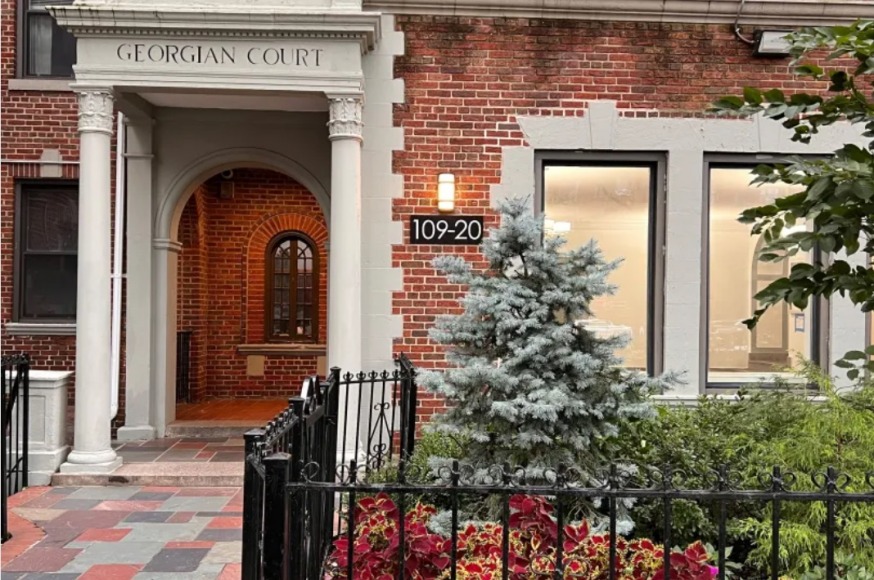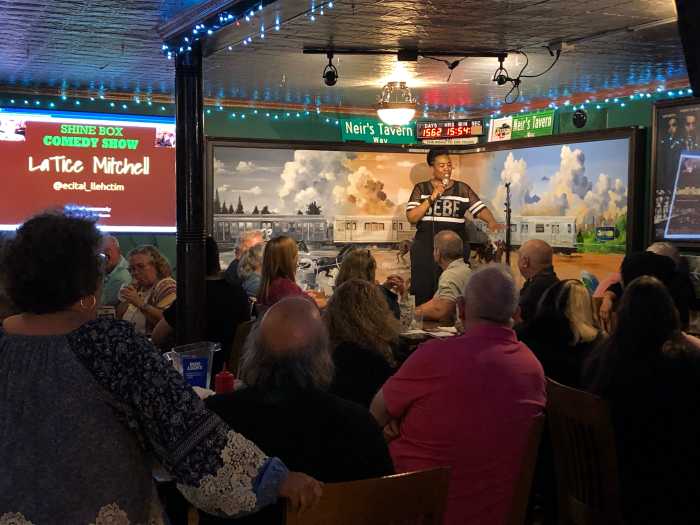
When offering condo units for sale at The Georgian in Forest Hills, Pinnacle Group CEO Joel Wiener failed to properly disclose capital repairs necessary for gas piping, says the state attorney general. Stephon Patrice Pujols-Johnson/THE CITY

This article was originally published by The CITY on Oct. 5
A torn-up bedroom wall and exposed pipes. That is what Joe Yin remembers from several years ago, after the Forest Hills condo unit he lived in was converted — along with most of the building — from rent-stabilized units.
It was also the first time he learned that the building needed major work on its gas pipelines — at significant cost to buyers.
“That’s how I got pissed off,” Yin, who lives in the Georgian Court apartment building on Queens Boulevard, told THE CITY. “They kept us in the dark, so I didn’t know there was an issue.”
But if residents like Yin were in the dark, that apparently wasn’t the case for the condo’s developer.
Joel Wiener, the CEO of real estate management company Pinnacle Group, admitted in a June settlement with state Attorney General Letitia James’s office that his company had failed to properly acknowledge the capital repairs necessary for gas piping when selling units in the converted Forest Hills condo.
In the settlement, which has not been previously disclosed, the reported “real estate billionaire” agreed to pay about $330,000 to the condo’s reserve fund to cover the cost of the piping, as well as $150,000 in penalties to the city Department of Housing Preservation and Development, the Attorney General’s Office exclusively told THE CITY and confirmed receipt of the payment.
Wiener, a prolific condo developer, has maintained his influential presence in New York City in spite of allegations and settlements over the years, including in connection with overcharging tenants.
Attorney general records show that he has converted at least 40 buildings across the city, including condo or co-op buildings that had previously been mostly rent-stabilized rentals, like The Georgian.
Wiener’s company also agreed to replace the homeowners’ electric stoves, which were installed during the conversion process, with gas stoves at the company’s expense.
Lack of Transparency
The president of the condo board, Sabrina Gao, told THE CITY that she and two other members of the board filed a complaint back in March of 2019 after a gas leak in the building raised concerns about maintenance and management transparency.
But the company said in the settlement agreement that it had never received any complaints of a gas leak by any resident prior to October 2021, and that a third-party inspector had certified that the metered “gas piping … is in fair condition and can remain in use” prior to and just after the condo conversion application was approved.
The settlement agreement mentioned that the company had explored options to “bring the gas piping for cooking ‘up to new con ed specifications’” as early as March 2017 — prior to the first five condos closing in June 2017, as well as the 21 purchasing agreements executed over the same period of time.
But the company did not disclose work to replace piping in three subsequent amendments until one that was filed in 2019, which itself did not meet the attorney general’s legal requirement for disclosure paperwork to condo buyers, according to the settlement agreement.
Gao said she had been unaware of these issues at the time of her condo purchase in the summer of 2017. In fact, the company only disclosed the need for repairs for the first time more than a year later, in a November 2018 condo board meeting, according to the settlement document.

New York Attorney General Letitia James speaks in Lower Manhattan in September. Ben Fractenberg/THE CITY
“I think they were trying to cover it, but then unfortunately on their part, the problem resurfaced about a year after the conversion to the condo happened,” Gao told THE CITY. “So we talked to the super and the people that are working on the building prior to the conversion, and found out that there were definitely issues that weren’t disclosed.”
History of Tensions
A spokesperson for the Pinnacle Group told THE CITY that the company only pursued those repair inquiries in 2017 as “a prudent manager” in anticipation of a local law passed in 2016 and slated to go into effect in the neighborhood in December of this year. The law, according to the settlement document, would require “more stringent inspection and testing of gas pipes.”
Some condo owners, however, disagreed with the company’s characterization of its management style. Others speculated that its repair inquiries indicated interest in passing on the cost to the condo’s reserve fund — the equivalent of a joint savings account paid for by homeowners.
“The sponsor knew that there was an issue, waited until they had the reserve fund funded, and then took money from the reserve fund to fix the issue,” said a homeowner on the third floor who declined to provide his name. “Whereas, you know, if they knew about it, they should have done it before even trying to turn it into a condo. And that way, they’re not kind of paying themselves back for repairs that they should have paid for.”
Other residents at The Georgian also alleged Pinnacle had included overcharges hidden within maintenance fees. A company spokesperson responded that “maintenance costs were fully disclosed to unit buyers” and remained constant over the course of its management.
A fire in the building in 2018, as the conversion from rentals to condos was underway, also threatened to displace some remaining rent-stabilized tenants. The spokesperson said the fire was caused by a resident overloading an outlet.
Repeat Offender
This is not the first time that the Pinnacle Group has come under legal scrutiny. Over the course of a 2006 investigation, the company — which owned 20,000 apartments in New York City at the time — conceded that it had overcharged rent-stabilized tenants at an apartment complex in The Bronx. Pinnacle agreed to pay $1 million to 300 tenants to make up for what they’d been overcharged, with interest. The company also agreed to “retain a forensic accounting firm to review rents charged on all of its properties in New York City.”
In 2011, the company settled a class-action lawsuit in which rent-regulated tenants in The Bronx alleged harassment, price gouging, and eviction attempts by the company.
The company then agreed to pay $2.5 million toward organizations that helped its tenants with legal claims. And in 2021, the company agreed to donate $50,000 to tenant organizing nonprofits over its failure to apply for a front-door lock system change at a Flushing condo converted from a rent-stabilized building.
According to a statement by the Attorney General’s Office at the time, the key fob distribution process following the unauthorized change was “overly burdensome” and led a “significant number of non-citizen and non-legal permanent resident Chinese tenants of the building with the impression that they were not entitled to access their own homes.”
James said in a statement to THE CITY that her office will continue to “defend residents from developers that seek to profit from shortcuts or use their power to deceive others into paying for their mistakes.”
“Joel Wiener and Pinnacle Group cut corners to protect their own fortune, and unfairly transferred the burden of a major repair onto hardworking homeowners,” James said. “Developers must deliver on their promises.”
THE CITY is an independent, nonprofit news outlet dedicated to hard-hitting reporting that serves the people of New York.





